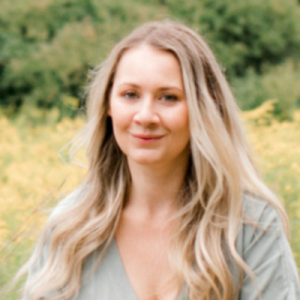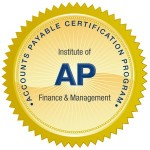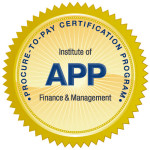
- Membership
- Certification
- Events
- Community
- About
- Help
In this episode, host Monica Brooks sits down with Courtney Cote, a seasoned Accounts Payable Manager with 16 years of experience in the engineering, manufacturing, and tech sectors. Recorded live at the IOFM Fall Conference and Expo, this conversation dives deep into the journey of AP automation and how it can elevate both processes and careers.
Courtney shares her firsthand experiences implementing automated solutions to drive efficiency, accuracy, and compliance in AP. For AP professionals curious about the power of automation and ready to take the next step in their own careers, this episode offers a wealth of practical advice and inspiring thoughts.

Courtney Cote
Courtney Cote is an accomplished Accounts Payable Manager with 16 years of experience in the engineering, manufacturing, and tech industries. With a strong passion for automation and system implementation, Courtney has dedicated her career to streamlining financial operations and optimizing accounts payable processes. She has successfully led the implementation of automated solutions to enhance efficiency, accuracy, and compliance. Courtney’s expertise lies in navigating industry-specific challenges and harnessing the power of technology to drive operational excellence.

Monica Brooks
Monica is a dynamic speaker who inspires others to reach their full potential, both professionally and personally. She excels in helping to maximize individuals’ capability in any situation, whether it’s facing new challenges, working with diverse teams, or receiving feedback and coaching. Monica has first-hand successful leadership experience: Before venturing out on her own, she led a team and increased her team members’ overall engagement while helping them build their proficiency. She now applies that experience and knowledge to helping others become more effective in their roles. Monica is certified with Franklin-Covey to facilitate “The 7 Habits of Highly Effective People” and has led a diverse group of managers through fundamental development programs. Her special spark is sure to leave you feeling inspired and motivated!
Grace Chlosta: Welcome to the IOFM podcast. This is a podcast for accounts payable and accounts receivable professionals who want to stay in the know with current AP and AR trends and ideas. We'll be interviewing professionals in this space on a wide variety of subjects, including automation, artificial intelligence, career growth, compliance, leadership, and much more.
Today we'll be interview Courtney Cote. Courtney Cote is an accomplished Accounts Payable Manager with 16 years of experience in the engineering, manufacturing, and tech industries. With a strong passion for automation and system implementation, Courtney has dedicated her career to streamlining financial operations and optimizing accounts payable processes. She has successfully led the implementation of automated solutions to enhance efficiency, accuracy, and compliance. Courtney's expertise lies in navigating industry-specific challenges and harnessing the power of technology to drive operational excellence.
00:01:04
And she'll be interviewed by Monica Brooks. Monica is a dynamic speaker who inspires others to reach their full potential, both professionally and personally. She excels in helping to maximize individuals' capability in any situation, whether it’s facing new challenges, working with diverse teams, or receiving feedback and coaching. Monica has first-hand successful leadership experience: Before venturing out on her own, she led a team and increased her team members' overall engagement while helping them build their proficiency. She now applies that experience and knowledge to helping others become more effective in their roles. Monica is certified with Franklin-Covey to facilitate "The 7 Habits of Highly Effective People" and has led a diverse group of managers through fundamental development programs. Her special spark is sure to leave you feeling inspired and motivated!
00:01:55
Monica Brooks: Courtney Cote, welcome to the podcast!
Courtney Cote: Thank you. It's so nice to be here.
Monica Brooks: I'm happy to have you here. We're talking about something that is super relevant in accounts payable and procurement and accounts receivable, and that is automation. Tell me about this automation that I hear you love so much, and I want to hear why you love it. So just give a brief introduction.
Courtney Cote: So, yeah, I am Courtney Cote. I have been in the accounts payable space for about 16 years now. Yeah, I just love automating the process. I've seen AP grow so much in 15 years from the basic, manually coding invoices and turning them in, and then we started scanning invoices and OCRs came along, and automated approvals. It was really when that started happening, and it our first project. It was in engineering. They took me and they said, "You're going to be the expert on this."
00:02:54
And that's when I realized, this is something I love. I love systems, I love the process, and I love streamlining things and making it easier. And ever since then, I love seeing what's new and upcoming. I know everyone on the subject is [all like], AI, AI, AI. I find it so interesting to be on the forefront of all of that.
Monica Brooks: You're talking about AI. What are your thoughts? What are you excited about when it comes to AI?
Courtney Cote: Well, to be honest, I work for an AI agent currently in tech, so I am wholly immersed in AI on a day-to-day basis. The question from our leaders comes all the time: "I want to know how much AI you're using every day, and what you're using it [for] within your day-to-day tasks."
00:03:40
I personally feel like it saves companies money now. For one example, on the receivable end, we use NetSuite. We wanted to make scripts to automatically post our cash receipts. For us to hire out a NetSuite consultant, they quoted us $5,000. We went and did ChatGPT and we prompted it, and we created the scripts ourselves, and taught ourselves how to enter them in NetSuite within a few hours, and started this process.
Monica Brooks: That's incredible. That's staying a step ahead and trying new things. I imagine there are companies out there who have not even maybe automated yet anything. Maybe they are still coding invoices. Maybe they are still manually filing invoices into a filing cabinet. What do you recommend the first step being for someone who's ready to take that first step into automation?
00:04:33
Courtney Cote: That's such a good question because I actually was just having a conversation with one of the attendees here and she said, "We still do everything manual. High-ups, they don't want to change it." And I think you have to get buy-in. You have to get buy-in from your leaders.
Monica Brooks: How do you do that, though?
Courtney Cote: You just have – the way I personally take a step, you have to be able to show them what it's going to do and the results that it's going to create, and the monetary value of doing it. And then, honestly, you just need to stay on them. You can't just let the thought slip. You have to keep putting it in their ear and really showing them that this can be the best outcome for the business.
00:05:15
Monica Brooks: I think that's such a great point because higher leadership, they want to see numbers. They want to know, like, tell your story in data. Tell your story – how much is this going to save the organization over time? That's how I feel you get the buy-in, is: How is this going to benefit them ultimately?
Courtney Cote: One hundred percent. And they might say no. There's a good chance they're going to keep saying no, but you just have to keep showing up.
Monica Brooks: What do you think? When a company is ready to roll out automation, what are some things that they can anticipate happening that they could possibly be proactive on and take steps to prevent some of these obstacles they may face?
00:05:55
Courtney Cote: Honestly, there's always going to be obstacles, and you're not going to know a lot of the time what they're going to be. They're just going to show up, and you're going to have to solution solve and problem solve through them as you're going. What you can do, though, to be proactive is really make the business – let the business know going forward what's going to happen, what you're working on. Keep them engaged. Keep them updated. And especially if you're running a team – sometimes I have found that teams can start to get a little scared when we start talking [about] automation, right? Everyone gets –
Monica Brooks: It's new, right? Yeah.
Courtney Cote: It's change management at this point. You need to make sure that you're engaging your team, that they feel that have a voice, that they are involved in the process, and that is what is going to drive the automation process to the best outcome, as well.
00:06:48
Monica Brooks: Now, you mentioned that obstacles are inevitable, right? That's going to happen. What kind of mindset should we have when we go into this new thing with automation and AI? How do we get ready for these obstacles, if they're going to happen?
Courtney Cote: Yeah, so I think with automation – and AI especially – we have to consider it's still learning like we are, right? The way I see things is, to get ready for it, you just have to keep an open mind, and you've got to be prepared to pivot.
Monica Brooks: Oh, that's so good.
Courtney Cote: I always say, "Like the 'Friends' episode, pivot!" If we have to pivot, that's fine. We can fix this. We can find an even better solution most of the time, but, realistically, we're all still learning. And even when you're working with these companies who are leading the automation, things are going to come up that they haven't seen before, so they're working through it with you at the same time.
00:07:43
Monica Brooks: Yeah, that makes sense because I think sometimes when we know the end goal, we think it's going to go this direct way. But, no, you have to sometimes say, "Oh, we didn't expect this. Now let's shift; let's pivot." But you mentioned having that open mindset and being willing to do that, like don't think it's going to be this way because this is how you planned it. Be open to change when you're trying to implement something big.
Courtney Cote: Exactly.
00:08:03
Monica Brooks: Do you have a success story around automation?
Courtney Cote: I've done a few expense automation. I think my last big one, to be honest with you, we were doing all of our expense reports manually, and everything was being paid out once a month through our payroll. So I kind of took that under. We went ahead and put in an expense program, completely automated it, automated the payout so everyone was getting paid weekly, [and] automated the clearing of the payouts into the ERP.
The business is super happy with it. Obviously, they're getting paid. And it saves so much time. We don't have payroll touching it anymore. You know we're not having to manually calculate taxes. Another automation we just did is we did a full P2P. I didn't say "did" because we're still working on it. It's been six months, and we're still working on it.
00:08:56
Monica Brooks: I was going to ask that, about a timeline. What is a typical timeline when you want to implement something like the automation or, in the future, AI?
Courtney Cote: Yeah, it really depends on what you're automating, who you're working with, [and] how big the scope of the project is. They're going to give you – you're always going to get a timeline. With that timeline, I always tag on at least a month. You need to be realistic. I never make promised with go-live until I'm absolutely sure, especially when it comes to accounts payable solutions for the business.
We need to think about this – and I was just talking to my director about it, actually. Stuff we do, everybody in the business touches, right? So when everybody in the business is touching an expense platform or a travel platform or automated approvals for invoicing, you need to make sure you're rolling it out when it is ready. You cannot cut corners. You can't just do it early to say, "I'm done so [that] I hit my timeline."
00:08:56
A lot of people will say they have this timeline and it has to be done by this day, but it's not ready. So that's always been my thing. They give a date. I say, "We don't go live until it's fully ready, [until] it's a full solution, because it's just going to go bad on us when it's not working properly."
Monica Brooks: It's going to cause more issues down the road if you don't just address it now and do it the right way, even if it gets pushed out a month or so.
Courtney Cote: A hundred percent.
Monica Brooks: You mentioned something about change management. How can leaders help their teams move through the change of something big and new, like automation?
00:10:34
I think open lines of communications is huge. Have the conversations. I like to feel out who I'm working [with], my team. You know as a manager also the different strengths and weaknesses within your team, and I know in different solutions there are different positions or steps. I know that this person on my team is really good with systems, so they would be perfect to be a system administrator on this. And I know this person on my team is really analytical, so let's start pushing them more into the analytics and the data.
00:11:13
Just let them have the conversation, make sure they're comfortable. But, at the same time, there's kind of a Catch-22 because I've been in situations where it's, "We're going to automate." The pushback and the "I don't want to do it. This is not what I want to do." And, unfortunately, that happens. Sometimes people, AP professionals, they just want to enter invoices, and that's what they want.
00:11:38
Monica Brooks: It's comfortable, right?
Courtney Cote: It is comfortable.
Monica Brooks: It's like, "This is what we're used to."
Courtney Cote: You get into your day and this is what you're used to. Unfortunately, there will be times when it's just like, "Well, we are going another way, so sometimes you have to jump on the wagon and try your best. Or, if not, you kind of have to, I'm sorry, go find something else that will make you happy."
00:11:57
Monica Brooks: Yeah, change is always hard, and I think leaders should expect that it's emotional because we're attached to certain way. Allow them to feel that way, but you can really start making progress when you get to the action, like, "Let's do this. Let's implement this." Play a part. Like you mentioned, tapping into those skills and to what they want to do, to help play a part and be a part of the change that's coming.
Courtney Cote: I completely agree. And just be patient. We need to be patient. We need to be kind. We need to realize that this is something new for everybody. Even if we get it really quickly, not everybody does, but they are going to grow and they're going to strength in time, so we just need to be patient.
Monica Brooks: What is something you can leave our audience, like one piece of advice for someone that's been thinking about automation but is kind of nervous about it? What could you share that may help them take a step forward?
00:12:54
Courtney Cote: I would say baby steps. Let's look at baby steps. Let's look at something that you're doing right now and you know automation could help. It's something small, but let's just try. Let's start with baby steps. Try automating smaller things first within your daily tasks, and you'll start to see, "Oh, this is so much smoother. I enjoy it."
And then start looking at the bigger picture and look at it holistically, like"' "Where do I want this accounts payable department to be? How can we start to automate?" I always say, like, "Start small. Think big. Work smarter, not harder. It's fearful, but just give it a chance. Start small. If everything goes well, keep going."
00:13:43
Monica Brooks: Courtney Cote. What a great – did I say that right, Cote?
Courtney Cote: Yes, you did.
Monica Brooks: Courtney Cote, what a great note to end on. Thank you so much for joining us on the podcast today. We appreciate your expertise in automation.
Courtney Cote: Great. Thanks so much.
Monica Brooks: All right, bye.
Courtney Cote: Bye.
Grace Chlosta: Thank you so much for listening to the IOFM podcast. Remember to head on over to the Member Forum to discuss today's episode and provide ideas for our next one. And to stay up to date on IOFM's current events, both in-person and virtually, head on over to IOFM.com.
Continuing Education Credits available:
Receive 1 CEU per hour of listening time towards IOFM programs:

 Receive 1 CEU per hour of listening time towards maintaining any AP and P2P related program through IOFM! These programs are designed to establish standards for the profession and recognize accounts payable and procure-to-pay professionals who, by possessing related work experience and passing a comprehensive exam, have met stringent requirements for mastering the financial operations body of knowledge.
Receive 1 CEU per hour of listening time towards maintaining any AP and P2P related program through IOFM! These programs are designed to establish standards for the profession and recognize accounts payable and procure-to-pay professionals who, by possessing related work experience and passing a comprehensive exam, have met stringent requirements for mastering the financial operations body of knowledge.
Continuing Education Credits available:
Receive 1 CEU per hour of listening time towards IOFM programs:

 Receive 1 CEU per hour of listening time towards maintaining any AP and P2P related program through IOFM! These programs are designed to establish standards for the profession and recognize accounts payable and procure-to-pay professionals who, by possessing related work experience and passing a comprehensive exam, have met stringent requirements for mastering the financial operations body of knowledge.
Receive 1 CEU per hour of listening time towards maintaining any AP and P2P related program through IOFM! These programs are designed to establish standards for the profession and recognize accounts payable and procure-to-pay professionals who, by possessing related work experience and passing a comprehensive exam, have met stringent requirements for mastering the financial operations body of knowledge.
What are you waiting for?
